Papers by Evşen AYMEN PEKER (Dr)
Dicle Üniversitesi Sosyal Bilimler Enstitüsü Dergisi, 2012
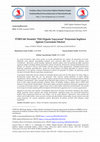
Ondokuz Mayis University Journal of Education Faculty, Nov 30, 2020
Oyunları) 8 grup halinde düzenlenmiştir. Öğrencilerin yabancı dil gelişim düzeylerini belirlemede... more Oyunları) 8 grup halinde düzenlenmiştir. Öğrencilerin yabancı dil gelişim düzeylerini belirlemede; uygulama öncesi ve sonrasına ait konuşma videoları, İngilizce başarı testi ve kelime bilgisi testlerinden yararlanılmıştır. Dile yönelik tutum ölçeği de tutumda meydana gelebilecek değişimi belirlemek adına uygulama öncesi ve sonrası uygulanmıştır. Uygulama sonucunda video kayıtları incelendiğinde öğrencilerin konuşma becerilerinde başlangıca göre gelişme olduğu gözlenmiş, kelime sayısında artış olduğu belirlenmiştir. Uygulanan başarı testi sonucunda öğrencilerin İngilizce bilgi seviyelerinde anlamlı bir artış olduğu t testi ile tespit edilmiştir. Öğrencilerin tutum puanlarında anlamlı artış olmakla birlikte, tutum puanının cinsiyet açısından farklılık oluşturmadığı da yine çalışma sonucunda ortaya konmuştur. Bu sonuçlar uygulanan projenin öğrencilerin dil gelişimi üzerinde etkili olduğunu ortaya koymaktadır.
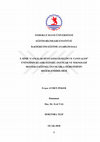
Bu araştırmada; 5. sınıf Fen Bilimleri Dersi Öğretim Programında yer alan Canlılar Dünyasını Geze... more Bu araştırmada; 5. sınıf Fen Bilimleri Dersi Öğretim Programında yer alan Canlılar Dünyasını Gezelim ve Tanıyalım ünitesinin öğretiminde Oyun Tabanlı Öğretimin öğrencilerin akademik başarı, çevresel farkındalık seviyesi, fen bilimleri, fen etkinlikleri, oyun ile bilgisayar kullanımı-bilgisayar oyunlarına yönelik tutumları ve kavramsal değişime yönelik etkileri araştırılmıştır. Araştırma Ondokuz Mayıs Üniversitesi Bilimsel Araştırma Projeleri kapsamında PYO.EGF.1904.14.006 no'lu proje olarak desteklenmiştir. Çalışmamda öncelikle tezin yürütülme sürecinde ihtiyaç duyduğum her an desteğini hissettiğim, fikir ve önerileri ile yol gösteren, tezin yazım sürecinde sabır, anlayış ve hoşgörü ile beni yönlendiren tez danışmanım Doç. Dr. Erol TAŞ'a "Ordu Üniversitesi"; tezimin oluşum sürecinin her aşamasında bilgilerinden yararlandığım, uygulama sürecinde fikirleri ile yol gösteren kıymetli hocalarım Yrd. Doç. Dr. E.
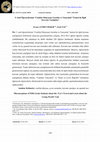
Yuzunci Yil Universitesi Egitim Fakultesi Dergisi, 2020
Öz: 5. sınıf öğrencilerinin "Canlılar Dünyasını Gezelim ve Tanıyalım" ünitesi ile ilgili kavram y... more Öz: 5. sınıf öğrencilerinin "Canlılar Dünyasını Gezelim ve Tanıyalım" ünitesi ile ilgili kavram yanılgılarını belirlemek amacıyla gerçekleştirilen çalışma, 2014-2015 eğitim öğretim yılında yürütülmüştür. Bu çalışmaya üç farklı okuldan 226 öğrenci katılmıştır. Karma araştırma yöntemlerinin uygulandığı çalışmada; nitel veriler yarı yapılandırılmış görüşmelerden, nicel veriler ise üç aşamalı kavram tanı testinden elde edilmiştir. Kavram tanı testinden elde edilen veriler Microsoft Excel'de hazırlanan uygulama ile değerlendirilmiştir. Böylece, öğrencilerin hem kavram yanılgıları hem de eksik bilgiye sahip oldukları konular belirlenmiştir. Araştırma sonucunda, tanı testindeki yirmi üç sorudan on ikisi ile ilişkili toplam kırk kavram yanılgısı tespit edilmiştir. Bireysel olarak kırk dokuz öğrenci ile gerçekleştirilen mülakat sonucunda belirlenen kavram yanılgıları, tanı testinde elde edilen kavram yanılgıları ile benzerlik göstermiştir. Tespit edilen kavram yanılgılarının bir bölümü literatürdeki çalışmalarla paralellik göstermesine rağmen, bu çalışma sonucunda daha önce ünite ile ilgili olarak ortaya konulmayan kavram yanılgıları da tespit edilmiştir. Eğitimcilerin, ders tasarımları geliştirirken bu kavram yanılgılarını dikkate alması, "Canlıları Tanıyalım" ve "İnsan ve Çevre İlişkileri" konularını öğrenecek öğrencilerin zihinlerinde bu kavramları daha doğru şekilde yapılandırmalarına katkı sağlayacaktır. Anahtar Kelimeler: canlılar dünyası, çevre sorunları, kavram yanılgısı, üç aşamalı test Misconceptions of Fifth Grade Students about the "Let's Travel and Learn about the Living World" Unit *Uluslararası Fen; Matematik, Girişimcilik ve Teknoloji Kongresinde sunulan sözlü bildirimin genişletilmiş versiyonu olan çalışma Ondokuz Mayıs Üniversitesi Bilimsel Araştırma Projeleri kapsamında PYO.EGF.1904.14.006 no'lu proje olarak desteklenen birinci yazarın doktora tezinin bir parçasından oluşmaktadır.
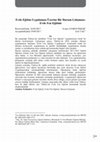
Bu calismada Turkiye’de yurutulen “Evde Fen Egitimi” uygulamasina ornek bir durum incelenmistir. ... more Bu calismada Turkiye’de yurutulen “Evde Fen Egitimi” uygulamasina ornek bir durum incelenmistir. Calismanin amaci, Turkiye’de 2010 yilindan itibaren uygulanmaya baslanan “Evde Fen Egitimi Uygulamasi” konusunda ornek bir durumu inceleyerek, uygulamanin ne sekilde yurutuldugu, uygulamanin olumlu yanlari ve zorluklarinin neler olabilecegi konusunda bilgiler elde etmektir. Durum calismasi seklinde yurutulen calismanin katilimcilari 2011-2012 Egitim Ogretim yilinda Evde Fen Egitimi faaliyeti yurutulen kiz ogrenci, bu ogrencinin anne babasi ve Fen Bilimleri ogretmenidir. Veriler, dokuman incelemesi, yari yapilandirilmis gorusmeler ve video kayitlari ile elde edilmistir. Yari yapilandirilmis gorusmeler sonunda elde edilen veriler betimsel analiz, ders kayitlari ise icerik analizi ile degerlendirilmistir. Calisma sonunda, Turkiye’de, saglik problemi nedeniyle okula devam edemeyen ogrencilerin, ozel egitim kurulunun belirledigi ders saati suresince Evde Egitim Uygulamasindan yararlanabildigi...

Arastirmanin amaci ortaokul 5.sinif Fen bilimleri dersi, Canlilar Dunyasini Gezelim ve Taniyalim ... more Arastirmanin amaci ortaokul 5.sinif Fen bilimleri dersi, Canlilar Dunyasini Gezelim ve Taniyalim unitesi icin gelistirilen klasik ve teknolojik destekli oyunlarin derslerde kullanimi sonrasi ogrencilerin oyunlar konusundaki goruslerini ortaya koymak ve bu yas grubu ogrencilerin daha cok ne tur oyunlar oynamaktan hoslandigini tespit etmektir. Olgu bilim deseninde yurutulen calismaya 2014-2015 egitim ogretim yilinda Samsun’da uc farkli okuldan 226 ogrenci katilmistir. Alti haftalik uygulama sonrasi, oyun konusundaki gorusleri belirlemek amaciyla 85 ogrenci ile yari yapilandirilmis gorusme gerceklestirilmistir. Ogrencilerin seciminde maksimum cesitlilik orneklemesi yontemine basvurulmustur. Mulakatta ogrencilerden oyunu tanimlamalari, oyun denildiginde akillarina gelen ilk uc kelimeyi ifade etmeleri istenmis, frekans tablosu elde edilmistir. Ogrencilerin oynamaktan hoslandigi oyunlari belirleyebilmek icin calismaya katilan tum ogrencilere, bir form verilmis, formlardan elde edilen veri...
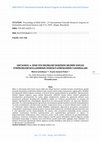
Journal of International Scientific Researches, 2018
Bilim ve teknolojide aktif olarak sürece dâhil olan bilinçli kararlar verebilen bireyler yetiştir... more Bilim ve teknolojide aktif olarak sürece dâhil olan bilinçli kararlar verebilen bireyler yetiştirilmesi, günlük yaşamda karşılaşılan problemlere bilimsel bakış açısıyla çözüm yolları bulunmasını sağlayacaktır. Özellikle fen eğitiminde bilimin doğasını anlamak ve bireysel olarak uygulayabilmek bir gerekliliktir. Öğretmenlerin, bilimsel bilginin doğasına uygun şekilde öğrencilere rehberlik ederek onların bilimsel gelişimlerini desteklemeleri gerekmektedir. Bu açıdan eğitim fakültelerinde özellikle fen eğitiminde bilimsel süreç becerilerinin gelişimini destekleyecek etkinliklere sıklıkla yer verilmesi gerekmektedir. İyi yetişmiş fen bilimleri öğretmenlerinin rehberliğinde, öğrencilerin fen okuryazarlık düzeyleri çok daha ileri düzeylere gelecektir. Fen okuryazarlığı gelişen öğrencilerin, fen konularını günlük hayatları içerisinde kullanabilmeleri ve çözüm üretebilmeleri çok daha kolay olacaktır. Araştırmanın amacı, 6. sınıf fen bilimleri dersi "madde ve ısı" ünitesinde bilimin doğasına yönelik etkinlikler kullanmanın öğrencilerin görüşlerine yansımalarını araştırmaktır. Araştırmanın çalışma grubunu, Samsun ilinde bulunan bir ortaokulda öğrenim görmekte olan 6. sınıf öğrencileri (n=26) oluşturmaktadır. Bu çalışma, nitel yöntemlerin kullanıldığı durum çalışması şeklinde tasarlamıştır. Verilerin toplanmasında; yarı yapılandırılmış görüşmeler ve öğrenci öz değerlendirmeleri kullanılmıştır. Nitel verilerinin analizi "içerik analizi" yaklaşımı ile gerçekleştirilmiştir. Çalışmanın verilerinin analizinden, bilimin doğasına yönelik yapılan etkinliklerin bilimin doğasına yönelik farkındalık oluşturduğu ve bilimsel süreç becerilerine pozitif yönde katkı sağladığı tespit edilmiştir. Fen bilimleri derslerinin öğretiminde bilimin doğasına yönelik etkinliklere daha fazla yer verilmesi araştırmacı ve öğretmenlere önerilmektedir.
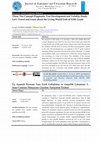
Journal of Computer and Education Research, 2019
The purpose of this study is to develop a valid and reliable three-tier concept diagnostic test w... more The purpose of this study is to develop a valid and reliable three-tier concept diagnostic test which for the Let's Travel and Learn about the Living World unit of fifth grade Science lesson and which that provide the students with the level of success and their misconceptions related to the unit. The developed test was applied to 210 5 th grade students attending at three secondary schools in the center of Samsun. A validity and reliability study were conducted for a three-tier concept diagnostic test consisting of a total of 23 items. The reliability of the concept diagnostic test was evaluated as 0.80 with the help of KR-20 reliability estimation method for the first stage questions. When the three items were evaluated together, the difficulty and discrimination values of the test were calculated as pj: 0.47 and rjx: 0.52. These data show that the developed test has a structure with reliable, medium difficulty and very good substances.
The Journal of International Lingual Social and Educational Sciences, 2019
Bu makale 5. Asos Uluslararası Eğitim Bilimleri Sempozyumunda sunulan sözlü bildirinin genişletil... more Bu makale 5. Asos Uluslararası Eğitim Bilimleri Sempozyumunda sunulan sözlü bildirinin genişletilmiş versiyonudur.

International Journal of New Trends in Arts Sports Science Education, Jun 22, 2014
The purpose of this study is investigate the effects of Thinking Agenda (student diary) on studen... more The purpose of this study is investigate the effects of Thinking Agenda (student diary) on student achievements. Thinking agenda is considered as one of the activities based on reflective thinking skills. It is one of the activities metacognitive developer. At the same time it is one of the Alternative Instrument of Assessment. For this purpose, Pre‐test‐Post‐test Control Group Designs was used as the research model. Another purpose of the study is find out how diary that students reflect their thinking is configured in science and technology education. For this purpose, the students wrote their diaries examined by content analysis technique. Research carried out with one of the 7th class in a primary school which is located Samsun. The sample of the research was a single class because of the lack of difference about applications and examples. Class was randomly selected. Experimental group consisted of 15 students and control group consisted of 17 students. Achievement test consisting of 20 questions was developed to determine the success of students. The number of questions was reduced to 15 at the end of the pilot implementation. Cronbach's alpha reliability coefficient of 0.718 was applied to the test. As a result of the Wilcoxon Signed Rank test, statistically significant differences between students' pre-test and post-test scores were determined. As a result of Mann-Whitney U test analysis was carried out, between the experimental and control group students' pre-test scores were not found statistically significant differences. However, significant difference was found between the post-test applications. Based on the findings, it can be said that diaries contribute to the seventh grade students both reflect on their thoughts and feelings and improve themselves the level of metacognitive. Study is limited to 32 students. Therefore, as a result of a greater number of studies to be conducted with the student diaries more comprehensive information can be accessed on the effects on student achievement. Keywords: thinking agenda, the student diary, science and technology, academic achievement OZET Calismanin amaci 7. Sinif “Yasamimizdaki Elektrik” unitesi kazanimlari ile ilgili yapilan sinif ici uygulamalara ek olarak, alternatif olcme degerlendirme araclarindan, ayni zamanda da ust bilisi gelistirici, yansitici dusunme becerisine dayali etkinliklerden biri olarak kabul edilen Dusunme Ajandasinin (Ogrenci Gunluklerinin) ogrenci basarisi uzerindeki etkisini incelemektir. Bu amacla on test-son test kontrol gruplu arastirma modeli kullanilmistir. Diger bir amac da fen egitiminde, ogrencilerin dusuncelerini yansittiklari gunluklerin ne sekilde yapilandirildigini ortaya koymaktir. Bu amacla ogrencilerin yazmis olduklari gunlukler Icerik Analizi teknigi ile incelenmistir. Arastirma Samsun ilindeki bir Ortaokulun 7. Siniflarindan biriyle gerceklestirilmistir. Yapilan uygulamalar ve ornekler konusunda farklilik olmamasi icin tek sinif arastirma orneklemini olusturmustur. Sinif rastgele secilmistir.15 ogrenci deney grubunu, 17 ogrenci ise kontrol grubunu olusturmustur. Ogrenci basarisini belirlemek icin 20 soruluk basari testi gelistirilmis, pilot uygulama sonunda soru sayisi 15’e indirilmistir. Uygulanan testin guvenirlik katsayisi KR-20 0,90 olarak bulunmustur. Wilcoxon Isaretli Siralar testi analizi sonucunda ogrencilerin on test -son test puanlari arasinda anlamli farklilik belirlenmistir. Gerceklestirilen Mann Whitney U Testi analizi sonucunda deney ve kontrol grubu ogrencilerinin on test puanlari arasinda anlamli bir farklilik bulunamamistir. Ancak son test uygulamalari arasinda anlamli farklilik belirlenmistir. Elde edilen bulgulara dayanarak, gunluklerin yedinci sinif ogrencilerinin duygu ve dusuncelerini yansitmalarina, ust bilis duzeyinde kendilerini gelistirmelerine katki sagladigi soylenebilir. Calisma 32 ogrenci ile sinirli oldugu icin daha fazla sayida ogrenci ile gerceklestirilecek calismalar sonucunda gunluklerin ogrenci basarisi uzerindeki etkilerine yonelik daha kapsamli bilgilere ulasilabilecegi soylenebilir. Anahtar Sozcukler : dusunme ajandasi, ogrenci gunlugu, fen ve teknoloji, akademik basari
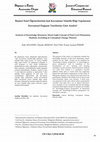
Istanbul University - DergiPark, Sep 1, 2014
The purpose of this study is to determine whether the knowledge structure of first level elementa... more The purpose of this study is to determine whether the knowledge structure of first level elementary school students for the ''light'' concept can be explained by "knowledge-as-theory perspective" or "knowledge-inpieces perspective" and to contribute to the development of new teaching and learning techniques. In this research, clinical interview method was used. This method is a qualitative research method which aims to reveal what lies coginively behind the individual's explanations. In this study 21 fifth-grade students were selected and interviewed as participants. Students with similar level of success and Socio-ecomomic status, were choosen. A dark room was prepared in the same school where experimental activities were held and a set of clinical interviews were arranged. It was concluded that the knowledge structures about light concepts of students are suitable for "knowledge-in-pieces perspective" in theoretical concepts and "knowledge-as-theory perspective" for descriptive concepts.
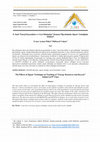
The Journal of International Lingual, Social and Educational Sciences , 2019
Bu çalışmanın amacı fen bilimleri öğretim programında yer alan “enerji kaynakları ve geri dönüşüm... more Bu çalışmanın amacı fen bilimleri öğretim programında yer alan “enerji kaynakları ve geri dönüşüm” konusunun öğretiminde, jigsaw tekniği kullanılmasının öğrencilerin akademik başarıları ve fene yönelik tutumlarına etkisini incelemektir. Çalışmada nicel araştırma yöntemlerinden eşitlenmemiş gruplara ön test-son test uygulamasına dayalı yarı deneysel desen kullanılmıştır. Araştırmanın örneklemi 8. Sınıfta öğrenim gören toplam 70 öğrenciden (28 kız-42 erkek) oluşmaktadır Araştırmada veri toplama aracı olarak Akademik Başarı Testi, Fen Bilimlerine Yönelik Tutum Ölçeği ve Fen Öğrenme Yaklaşımlarına Yönelik Tutum Ölçeği kullanılmıştır. Veriler, MANCOVA ve ANCOVA teknikleri ile analiz edilmiştir. Araştırmanın sonucunda; jigsaw tekniğini içeren tasarımın öğrencilerin akademik başarılarını olumlu yönde etkilediği, fen bilimleri dersi ve fen öğrenme yaklaşımlarına yönelik tutum son testleri üzerinde ise anlamlı bir etkisi olmadığı belirlenmiştir.
Anahtar Kelimeler: İşbirlikli öğrenme, jigsaw tekniği, enerji kaynakları, tutum
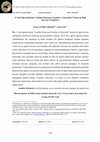
YYÜ Eğitim Fakültesi Dergisi (YYU Journal of Education Faculty, 2020
Abstract: The study was carried out in order to determine the misconceptions of the 5th grade
st... more Abstract: The study was carried out in order to determine the misconceptions of the 5th grade
students about the “Let’s Travel and Learn about the Living World” unit in the 2014-2015
academic year. 226 fifth grade students from three different schools participated in this study.
In the study that quantitative and qualitative research methods were applied, qualitative data
were obtained from semi-structured interviews and quantitative data were obtained from three-
tier concept diagnosis test. The data obtained from the concept diagnostic test were evaluated
with the application prepared in Microsoft Excel. Thus, students 'misconceptions and students'
missing information were determined. As a result of the study, a total of forty misconceptions
which were related to twelve of the twenty-three questions found in the diagnostic test were
identified. The misconceptions determined as a result of the interviews attended by 26 students
showed similarities with the misconceptions obtained in the diagnostic test. Although some of
the misconceptions detected are in parallel with the studies in the literature, misconceptions
about the unit which were not revealed before were determined in this study. If the educators
take into account the misconceptions determined while developing the course designs, the
students who will learn “Let’s of Living Things” and “Human-Environment Relationship” will
be able to construct these concepts in their minds more accurately.
Keywords:living world, environmental problems, misconceptions, three-tier test
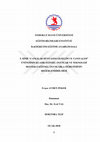
PhD Thesis, 2018
Bu araştırmanın amacı; 5. sınıf Fen Bilimleri dersi Canlılar Dünyasını Gezelim ve Tanıyalım ünite... more Bu araştırmanın amacı; 5. sınıf Fen Bilimleri dersi Canlılar Dünyasını Gezelim ve Tanıyalım ünitesi için eğitsel içerikli, klasik ve teknoloji destekli oyunları kapsayan öğretim tasarımları geliştirmek, bu tasarımların ders içi ve ders dışı eğitim süreçlerinde öğrencilerin akademik başarıları, çevresel farkındalıkları, fen bilimleri, fen etkinlikleri, oyun ile bilgisayar kullanımına yönelik tutumları ve kavramsal değişimleri üzerindeki etkisini ortaya koymaktır. Öğrencilerin oyun tabanlı öğrenme modeli uygulama süreci ve oyun konusundaki görüşlerini belirlemek de araştırmanın bir diğer amacıdır. Araştırma nicel ve nitel yöntemlerin birleştirildiği karma yöntem araştırması şeklinde yürütülmüştür. Araştırmanın nicel boyutunda deneysel araştırma yöntemi kullanılmıştır. Ders içi süreç ön test- son test kontrol gruplu yarı deneysel araştırma deseni; ders dışı süreç ise ön test- son test kontrol gruplu gerçek deneysel araştırma deseni şeklinde, üçer farklı grupla yürütülmüştür. Canlılar Dünyasını Gezelim ve Tanıyalım ünitesi öğretiminde, Deney-1 grubunda (DG1) klasik sınıf içi oyunlar ve drama uygulamalarını içeren tasarım, Deney-2 grubunda (DG2) teknoloji destekli oyunları içeren tasarım, Kontrol grubunda (KG) ise 2013 Fen Bilimleri Dersi Öğretim Programı (FBDÖP) etkinlikleri kullanılmıştır. Araştırma 2014-2015 eğitim- öğretim yılı ikinci döneminde üç farklı okulun 5. sınıfına devam eden toplam 226 öğrenci ile (Ders İçi Süreç (DG1: 60, DG2: 62, KG:62) ve Ders Dışı Süreç (DG1: 14, DG2: 14, KG:14)) gerçekleşmiştir. Araştırmanın nicel verileri; Canlılar Dünyasını Gezelim ve Tanıyalım Üç Aşamalı Kavram Yanılgısı Testi (ABT), Çevresel Farkındalık Ölçeği (ÇFÖ), Fen Bilimlerine Yönelik Tutum Ölçeği (FByTÖ), Fen Öğrenme Yaklaşımına Yönelik Tutum Ölçeği (FÖYyTÖ), Oyuna Yönelik Tutum Ölçeği (OyTÖ), Bilgisayar Kullanımı-Bilgisayar Oyunlarına yönelik Tutum Ölçeği (BKyTÖ)'dir. Nitel verilerin elde edilmesinde araştırmacı ve katılımcı günlükleri, yarı yapılandırılmış görüşmeler, video kayıtlarıdır. Nicel verilerin analizinde parametrik ve non parametrik teknikler; nitel verilerin analizinde ise betimsel ve içerik analizi yöntemleri kullanılmıştır. Araştırma sonucunda, klasik ve teknoloji destekli oyunların hem ders içi hem de ders dışı uygulanmasının, öğrencilerin akademik başarılarını etkilediği, öğrencilerin bilgi düzeyini arttırdığı, öğrencilerin sahip olduğu kavram yanılgılarının giderilmesi için kullanılabildiği ve öğrencilerin sahip olduğu kavram yanılgılarının azalmasında etkili olduğu belirlenmiştir. Ayrıca oyun programının ders içi uygulanmasının deney gruplarındaki öğrencilerin oyuna yönelik tutumlarının gelişmesine katkı sağladığı, öğrencilerin çevresel farkındalık seviyelerini artırdığı, deneysel uygulamaya katılan tüm öğrencilerin fen öğrenme yaklaşımına yönelik tutumlarının gelişmesinde etkili olduğu tespit edilmiştir. Teknoloji destekli oyunların ders içinde kullanımının bilginin kalıcılığında, öğrencilerin Fen'e yönelik tutum ile bilgisayar kullanımı ve bilgisayar oyununa yönelik tutum puanının artmasında; ders dışı uygulama sürecinde ise öğrencilerin fen öğrenme yaklaşımına yönelik tutumlarının gelişmesinde etkili olduğu sonucuna ulaşılmıştır. Bunlara ek olarak araştırmayla fen tutumu, cinsiyet ve baba mezuniyetinin çevresel farkındalık üzerinde anlamlı yordayıcı olduğu, anne mezuniyetinin önemli bir etkiye sahip olmadığı gerek deney grupları gerekse de kontrol grubu öğrencilerinin birçoğu için oyunun eğlence ve öğrenme kavramlarını ifade ettiği belirlenmiştir. Öğrencilerin, ister klasik isterse teknoloji destekli eğitsel oyunlar olsun öğrenmelerinde etkili olduğu konusunda görüşleri olduğu ve teknoloji tabanlı olmayan 33, teknoloji tabanlı 88 farklı oyunu oynamaktan hoşlandıkları sonuçlarına ulaşılmıştır.
The purpose of this study is to develop teaching designs which include educational, classical and technology assisted games for the Let's Travel and Learn about the Living World unit of fifth grade Science lesson, and to show the effects of these designs on the academic achievement and environmental awareness of students and students' attitudes towards science, science activities, game and using computer and student's conceptual changes within curricular and extracurricular educational processes. Another purpose of the study is to find out the views of students on game based learning model application process and about the game. The study was conducted as a mixed method research which combines quantitative and qualitative methods. In the quantitative aspect of the study, "experimental research method" was used. Curricular process was conducted with quasi-experimental design with pre-test post-test control group; while the extracurricular process was conducted with true experimental research design with pre-test post-test control group, with three different groups in each. For the teaching of Let's Travel and Learn about the Living World unit, a design which included classical curricular games and drama practices was used in Experimental-1 group (EG1), a design which included technology assisted games was used in Experimental-2 group (EG2), and 2013 Science lesson Teaching Program (PSLTP) was used in Control Group (CG). The study was conducted with a total of 226 students studying in 5th grade of three different schools during the second semester of 2014-2015 academic year (Curricular process (EG1: 60, EG2: 62, CG:62) and Extracurricular process (EG1: 14, EG2: 14, CG:14)). The quantitative data of the study were collected with Let's Travel and Learn about the Living World three-tiers misconception test (ABT), Environmental Awareness Scale (AAS), Attitude towards Physical Sciences Scale (AtPSS), Attitude towards Science Learning Approach (AtSLA), Attitude towards Game Scale (AtGS), and Attitude towards Computer Use- Computer Games (AtCUCG). The qualitative data of the study were collected with researcher and participant diaries, semi-structured interviews and video records. Parametric and non-parametric techniques were used in the analysis of qualitative data, while descriptive and content analysis methods were used in the analysis of quantitative data. The results of the study showed that both curricular and extracurricular application of classical and technology assisted games influenced students' academic achievement, increased students' level of information, could be used to clear students' misconceptions and were effective in decreasing students' misconceptions. In addition, it was found that curricular implementation of game program contributed to the development of students' attitudes towards game in experimental groups, increased students' levels of environmental awareness, and influenced the development of the attitudes of all students participating in experimental implementation towards learning science. It was concluded that using technology assisted games in lessons were effective in the permanence of knowledge, in increasing attitude scores of students towards science and computer use and computer games; while using technology assisted games in extracurricular practices process was effective in developing attitudes towards learning science. In addition to these, the results of the study showed that attitude towards science, gender and father's educational status was a significant predictor of environmental awareness, while mother's educational status did not have a significant influence for most of the students in both experimental groups and the control group, games expressed the concept of fun and learning. It was concluded that students thought games, whether technology assisted or educational, were effective on their learning and students liked playing 33 games which were not technology based and 88 games which were technology based.

Ortaokul 5. Sınıf Öğrencilerinin "Oyun" Kavramı ile İlgili Görüşleri: Samsun Örneği, 2019
Araştırmanın amacı ortaokul 5.sınıf Fen bilimleri dersi, Canlılar Dünyasını Gezelim ve Tanıyalım ... more Araştırmanın amacı ortaokul 5.sınıf Fen bilimleri dersi, Canlılar Dünyasını Gezelim ve Tanıyalım ünitesi için geliştirilen klasik ve teknolojik destekli oyunların derslerde kullanımı sonrası öğrencilerin oyunlar konusundaki görüşlerini ortaya koymak ve bu yaş grubu öğrencilerin daha çok ne tür oyunlar oynamaktan hoşlandığını tespit etmektir.
Olgu bilim deseninde yürütülen çalışmaya 2014-2015 eğitim öğretim yılında Samsun’da üç farklı okuldan 226 öğrenci katılmıştır. Altı haftalık uygulama sonrası, oyun konusundaki görüşleri belirlemek amacıyla 85 öğrenci ile yarı yapılandırılmış görüşme gerçekleştirilmiştir. Öğrencilerin seçiminde maksimum çeşitlilik örneklemesi yöntemine başvurulmuştur. Mülakatta öğrencilerden oyunu tanımlamaları, oyun denildiğinde akıllarına gelen ilk üç kelimeyi ifade etmeleri istenmiş, frekans tablosu elde edilmiştir.
Öğrencilerin oynamaktan hoşlandığı oyunları belirleyebilmek için çalışmaya katılan tüm öğrencilere, bir form verilmiş, formlardan elde edilen veriler kullanılarak frekans tabloları elde edilmiştir.
Araştırma sonucunda deney gruplarındaki öğrencilerin oyunu tanımlarken eğlence ve öğrenme kavramlarını sıklıkla kullandıkları belirlenmiştir. Kontrol grubu öğrencileri tanımlarında sıklıkla eğlenceyi vurgulamıştır. Ayrıca öğrenciler tanımlarında duygusal ifadeler, kurallılık, arkadaşlık ilişkisi, bedensel ve zihinsel gelişim, yaşam ve oyunun zararları gibi kavramlara da yer vermiştir. Öğrencilerin oyun tanımları yetişkinlerin ortaya koyduğu tanımlarla benzerlik göstermektedir.
Öğrencilerin oyun denilince aklına ilk gelen kelime eğlence, ikinci kelime ise öğrenme, ders, bilgilenmektir. Öğrenciler oyun esnasında hissettikleri duyguları da bu üç kavram içerisinde belirtmiştir. Öğrenciler, oyunun olumlu (mutluluk, sevinç, neşe, huzur, zevk alma, heyecan vb.) ve olumsuz duygular (üzüntü, kızgınlık vb) çağrıştırdığını belirtmiştir.
Oynamaktan hoşlanılan oyunlarla ilgili elde edilen veriler değerlendirildiğinde öğrencilerin teknoloji tabanlı olmayan 33, teknoloji tabanlı olan 88 farklı oyunu oynamaktan hoşlandıkları sonucuna ulaşılmıştır.
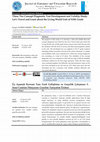
Article Info Abstract The purpose of this study is to develop a valid and reliable three-tier con... more Article Info Abstract The purpose of this study is to develop a valid and reliable three-tier concept diagnostic test which for the Let's Travel and Learn about the Living World unit of fifth grade Science lesson and which that provide the students with the level of success and their misconceptions related to the unit. The developed test was applied to 210 5 th grade students attending at three secondary schools in the center of Samsun. A validity and reliability study were conducted for a three-tier concept diagnostic test consisting of a total of 23 items. The reliability of the concept diagnostic test was evaluated as 0.80 with the help of KR-20 reliability estimation method for the first stage questions. When the three items were evaluated together, the difficulty and discrimination values of the test were calculated as pj: 0.47 and rjx: 0.52. These data show that the developed test has a structure with reliable, medium difficulty and very good substances.
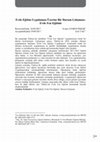
Bu çalışmada Türkiye’de yürütülen “Evde Fen Eğitimi” uygulamasına örnek bir durum incelenmiştir. ... more Bu çalışmada Türkiye’de yürütülen “Evde Fen Eğitimi” uygulamasına örnek bir durum incelenmiştir. Çalışmanın amacı, Türkiye’de 2010 yılından itibaren uygulanmaya başlanan “Evde Fen Eğitimi Uygulaması” konusunda örnek bir durumu inceleyerek, uygulamanın ne şekilde yürütüldüğü, uygulamanın olumlu yanları ve zorluklarının neler olabileceği konusunda bilgiler elde etmektir. Durum çalışması şeklinde yürütülen çalışmanın katılımcıları 2011-2012 Eğitim Öğretim yılında Evde Fen Eğitimi faaliyeti yürütülen kız öğrenci, bu öğrencinin anne babası ve Fen Bilimleri öğretmenidir. Veriler, doküman incelemesi, yarı yapılandırılmış görüşmeler ve video kayıtları ile elde edilmiştir. Yarı yapılandırılmış görüşmeler sonunda elde edilen veriler betimsel analiz, ders kayıtları ise içerik analizi ile değerlendirilmiştir.
Çalışma sonunda, Türkiye’de, sağlık problemi nedeniyle okula devam edemeyen öğrencilerin, özel eğitim kurulunun belirlediği ders saati süresince Evde Eğitim Uygulamasından yararlanabildiği belirlenmiştir. Öğretmenin farklı öğretim yöntemlerini kullandığı, öğrencinin süreçte daha pasif kaldığı gözlenmiştir.
Öğrencinin, akranları ile fikir alışverişinde bulunma şansının olmadığı, uygulama sürecinde bazı konuları anlamada zorlandığı görülmüştür. Uygulamanın öğrencinin bilişsel ve duyuşsal gelişimi üzerinde olumlu etkisi olduğu, sosyal gelişim açısından yetersiz kaldığı belirlenmiştir. Çalışma sonucunda elde edilen veriler hem Türkiye hem de diğer ülkeler için Türkiye’de Evde Fen Eğitimi konusunda kaynak oluşturmaktadır.
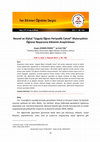
Çalışmanın temel amacı “Uygula Öğren Periyodik Cetvel” adı verilen materyali nesnel ve dijital
ol... more Çalışmanın temel amacı “Uygula Öğren Periyodik Cetvel” adı verilen materyali nesnel ve dijital
olarak geliştirmek, uygulamak ve materyallerin öğrenci başarısı, bilişsel gelişim, üniteye yönelik
tutum ve bilgi kalıcılığına etkisini araştırmaktır. 2013-2014 eğitim öğretim yılında sekizinci sınıfa
devam eden toplam 110 öğrenci örneklemi oluşturmaktadır. Veri toplama araçları başarı testi ve
tutum ölçeğidir. Uygulama sonunda başarının Deney Grubu-1 (DG1) lehine arttığı gözlenmiştir
(p<0.05). DG1 öğrencileri bilişsel öğrenme açısından üç bilişsel seviyede de (bilgi, kavrama,
uygulama) diğer iki gruba göre daha başarılıdır. Bilginin kalıcılığı açısından ise Kontrol Grubu (KG)
öğrencilerinde en az değişim olmuştur. Nesnel ve dijital materyalin öğrencilerin üniteye yönelik
tutumları üzerinde de anlamlı etkisinin olduğu tespit edilmiştir. Bu nedenle periyodik cetvel
konusu işlenirken hem nesnel hem de dijital materyallerin kullanılması, öğrencilerin başarılarının
artması açısından etkilidir.
Anahtar Kelimeler: Fen eğitimi, nesnel/dijital materyal, periyodik cetvel

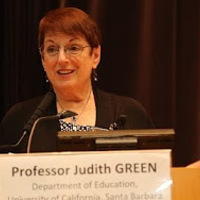

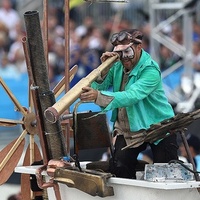







Uploads
Papers by Evşen AYMEN PEKER (Dr)
Anahtar Kelimeler: İşbirlikli öğrenme, jigsaw tekniği, enerji kaynakları, tutum
students about the “Let’s Travel and Learn about the Living World” unit in the 2014-2015
academic year. 226 fifth grade students from three different schools participated in this study.
In the study that quantitative and qualitative research methods were applied, qualitative data
were obtained from semi-structured interviews and quantitative data were obtained from three-
tier concept diagnosis test. The data obtained from the concept diagnostic test were evaluated
with the application prepared in Microsoft Excel. Thus, students 'misconceptions and students'
missing information were determined. As a result of the study, a total of forty misconceptions
which were related to twelve of the twenty-three questions found in the diagnostic test were
identified. The misconceptions determined as a result of the interviews attended by 26 students
showed similarities with the misconceptions obtained in the diagnostic test. Although some of
the misconceptions detected are in parallel with the studies in the literature, misconceptions
about the unit which were not revealed before were determined in this study. If the educators
take into account the misconceptions determined while developing the course designs, the
students who will learn “Let’s of Living Things” and “Human-Environment Relationship” will
be able to construct these concepts in their minds more accurately.
Keywords:living world, environmental problems, misconceptions, three-tier test
The purpose of this study is to develop teaching designs which include educational, classical and technology assisted games for the Let's Travel and Learn about the Living World unit of fifth grade Science lesson, and to show the effects of these designs on the academic achievement and environmental awareness of students and students' attitudes towards science, science activities, game and using computer and student's conceptual changes within curricular and extracurricular educational processes. Another purpose of the study is to find out the views of students on game based learning model application process and about the game. The study was conducted as a mixed method research which combines quantitative and qualitative methods. In the quantitative aspect of the study, "experimental research method" was used. Curricular process was conducted with quasi-experimental design with pre-test post-test control group; while the extracurricular process was conducted with true experimental research design with pre-test post-test control group, with three different groups in each. For the teaching of Let's Travel and Learn about the Living World unit, a design which included classical curricular games and drama practices was used in Experimental-1 group (EG1), a design which included technology assisted games was used in Experimental-2 group (EG2), and 2013 Science lesson Teaching Program (PSLTP) was used in Control Group (CG). The study was conducted with a total of 226 students studying in 5th grade of three different schools during the second semester of 2014-2015 academic year (Curricular process (EG1: 60, EG2: 62, CG:62) and Extracurricular process (EG1: 14, EG2: 14, CG:14)). The quantitative data of the study were collected with Let's Travel and Learn about the Living World three-tiers misconception test (ABT), Environmental Awareness Scale (AAS), Attitude towards Physical Sciences Scale (AtPSS), Attitude towards Science Learning Approach (AtSLA), Attitude towards Game Scale (AtGS), and Attitude towards Computer Use- Computer Games (AtCUCG). The qualitative data of the study were collected with researcher and participant diaries, semi-structured interviews and video records. Parametric and non-parametric techniques were used in the analysis of qualitative data, while descriptive and content analysis methods were used in the analysis of quantitative data. The results of the study showed that both curricular and extracurricular application of classical and technology assisted games influenced students' academic achievement, increased students' level of information, could be used to clear students' misconceptions and were effective in decreasing students' misconceptions. In addition, it was found that curricular implementation of game program contributed to the development of students' attitudes towards game in experimental groups, increased students' levels of environmental awareness, and influenced the development of the attitudes of all students participating in experimental implementation towards learning science. It was concluded that using technology assisted games in lessons were effective in the permanence of knowledge, in increasing attitude scores of students towards science and computer use and computer games; while using technology assisted games in extracurricular practices process was effective in developing attitudes towards learning science. In addition to these, the results of the study showed that attitude towards science, gender and father's educational status was a significant predictor of environmental awareness, while mother's educational status did not have a significant influence for most of the students in both experimental groups and the control group, games expressed the concept of fun and learning. It was concluded that students thought games, whether technology assisted or educational, were effective on their learning and students liked playing 33 games which were not technology based and 88 games which were technology based.
Olgu bilim deseninde yürütülen çalışmaya 2014-2015 eğitim öğretim yılında Samsun’da üç farklı okuldan 226 öğrenci katılmıştır. Altı haftalık uygulama sonrası, oyun konusundaki görüşleri belirlemek amacıyla 85 öğrenci ile yarı yapılandırılmış görüşme gerçekleştirilmiştir. Öğrencilerin seçiminde maksimum çeşitlilik örneklemesi yöntemine başvurulmuştur. Mülakatta öğrencilerden oyunu tanımlamaları, oyun denildiğinde akıllarına gelen ilk üç kelimeyi ifade etmeleri istenmiş, frekans tablosu elde edilmiştir.
Öğrencilerin oynamaktan hoşlandığı oyunları belirleyebilmek için çalışmaya katılan tüm öğrencilere, bir form verilmiş, formlardan elde edilen veriler kullanılarak frekans tabloları elde edilmiştir.
Araştırma sonucunda deney gruplarındaki öğrencilerin oyunu tanımlarken eğlence ve öğrenme kavramlarını sıklıkla kullandıkları belirlenmiştir. Kontrol grubu öğrencileri tanımlarında sıklıkla eğlenceyi vurgulamıştır. Ayrıca öğrenciler tanımlarında duygusal ifadeler, kurallılık, arkadaşlık ilişkisi, bedensel ve zihinsel gelişim, yaşam ve oyunun zararları gibi kavramlara da yer vermiştir. Öğrencilerin oyun tanımları yetişkinlerin ortaya koyduğu tanımlarla benzerlik göstermektedir.
Öğrencilerin oyun denilince aklına ilk gelen kelime eğlence, ikinci kelime ise öğrenme, ders, bilgilenmektir. Öğrenciler oyun esnasında hissettikleri duyguları da bu üç kavram içerisinde belirtmiştir. Öğrenciler, oyunun olumlu (mutluluk, sevinç, neşe, huzur, zevk alma, heyecan vb.) ve olumsuz duygular (üzüntü, kızgınlık vb) çağrıştırdığını belirtmiştir.
Oynamaktan hoşlanılan oyunlarla ilgili elde edilen veriler değerlendirildiğinde öğrencilerin teknoloji tabanlı olmayan 33, teknoloji tabanlı olan 88 farklı oyunu oynamaktan hoşlandıkları sonucuna ulaşılmıştır.
Çalışma sonunda, Türkiye’de, sağlık problemi nedeniyle okula devam edemeyen öğrencilerin, özel eğitim kurulunun belirlediği ders saati süresince Evde Eğitim Uygulamasından yararlanabildiği belirlenmiştir. Öğretmenin farklı öğretim yöntemlerini kullandığı, öğrencinin süreçte daha pasif kaldığı gözlenmiştir.
Öğrencinin, akranları ile fikir alışverişinde bulunma şansının olmadığı, uygulama sürecinde bazı konuları anlamada zorlandığı görülmüştür. Uygulamanın öğrencinin bilişsel ve duyuşsal gelişimi üzerinde olumlu etkisi olduğu, sosyal gelişim açısından yetersiz kaldığı belirlenmiştir. Çalışma sonucunda elde edilen veriler hem Türkiye hem de diğer ülkeler için Türkiye’de Evde Fen Eğitimi konusunda kaynak oluşturmaktadır.
olarak geliştirmek, uygulamak ve materyallerin öğrenci başarısı, bilişsel gelişim, üniteye yönelik
tutum ve bilgi kalıcılığına etkisini araştırmaktır. 2013-2014 eğitim öğretim yılında sekizinci sınıfa
devam eden toplam 110 öğrenci örneklemi oluşturmaktadır. Veri toplama araçları başarı testi ve
tutum ölçeğidir. Uygulama sonunda başarının Deney Grubu-1 (DG1) lehine arttığı gözlenmiştir
(p<0.05). DG1 öğrencileri bilişsel öğrenme açısından üç bilişsel seviyede de (bilgi, kavrama,
uygulama) diğer iki gruba göre daha başarılıdır. Bilginin kalıcılığı açısından ise Kontrol Grubu (KG)
öğrencilerinde en az değişim olmuştur. Nesnel ve dijital materyalin öğrencilerin üniteye yönelik
tutumları üzerinde de anlamlı etkisinin olduğu tespit edilmiştir. Bu nedenle periyodik cetvel
konusu işlenirken hem nesnel hem de dijital materyallerin kullanılması, öğrencilerin başarılarının
artması açısından etkilidir.
Anahtar Kelimeler: Fen eğitimi, nesnel/dijital materyal, periyodik cetvel
Anahtar Kelimeler: İşbirlikli öğrenme, jigsaw tekniği, enerji kaynakları, tutum
students about the “Let’s Travel and Learn about the Living World” unit in the 2014-2015
academic year. 226 fifth grade students from three different schools participated in this study.
In the study that quantitative and qualitative research methods were applied, qualitative data
were obtained from semi-structured interviews and quantitative data were obtained from three-
tier concept diagnosis test. The data obtained from the concept diagnostic test were evaluated
with the application prepared in Microsoft Excel. Thus, students 'misconceptions and students'
missing information were determined. As a result of the study, a total of forty misconceptions
which were related to twelve of the twenty-three questions found in the diagnostic test were
identified. The misconceptions determined as a result of the interviews attended by 26 students
showed similarities with the misconceptions obtained in the diagnostic test. Although some of
the misconceptions detected are in parallel with the studies in the literature, misconceptions
about the unit which were not revealed before were determined in this study. If the educators
take into account the misconceptions determined while developing the course designs, the
students who will learn “Let’s of Living Things” and “Human-Environment Relationship” will
be able to construct these concepts in their minds more accurately.
Keywords:living world, environmental problems, misconceptions, three-tier test
The purpose of this study is to develop teaching designs which include educational, classical and technology assisted games for the Let's Travel and Learn about the Living World unit of fifth grade Science lesson, and to show the effects of these designs on the academic achievement and environmental awareness of students and students' attitudes towards science, science activities, game and using computer and student's conceptual changes within curricular and extracurricular educational processes. Another purpose of the study is to find out the views of students on game based learning model application process and about the game. The study was conducted as a mixed method research which combines quantitative and qualitative methods. In the quantitative aspect of the study, "experimental research method" was used. Curricular process was conducted with quasi-experimental design with pre-test post-test control group; while the extracurricular process was conducted with true experimental research design with pre-test post-test control group, with three different groups in each. For the teaching of Let's Travel and Learn about the Living World unit, a design which included classical curricular games and drama practices was used in Experimental-1 group (EG1), a design which included technology assisted games was used in Experimental-2 group (EG2), and 2013 Science lesson Teaching Program (PSLTP) was used in Control Group (CG). The study was conducted with a total of 226 students studying in 5th grade of three different schools during the second semester of 2014-2015 academic year (Curricular process (EG1: 60, EG2: 62, CG:62) and Extracurricular process (EG1: 14, EG2: 14, CG:14)). The quantitative data of the study were collected with Let's Travel and Learn about the Living World three-tiers misconception test (ABT), Environmental Awareness Scale (AAS), Attitude towards Physical Sciences Scale (AtPSS), Attitude towards Science Learning Approach (AtSLA), Attitude towards Game Scale (AtGS), and Attitude towards Computer Use- Computer Games (AtCUCG). The qualitative data of the study were collected with researcher and participant diaries, semi-structured interviews and video records. Parametric and non-parametric techniques were used in the analysis of qualitative data, while descriptive and content analysis methods were used in the analysis of quantitative data. The results of the study showed that both curricular and extracurricular application of classical and technology assisted games influenced students' academic achievement, increased students' level of information, could be used to clear students' misconceptions and were effective in decreasing students' misconceptions. In addition, it was found that curricular implementation of game program contributed to the development of students' attitudes towards game in experimental groups, increased students' levels of environmental awareness, and influenced the development of the attitudes of all students participating in experimental implementation towards learning science. It was concluded that using technology assisted games in lessons were effective in the permanence of knowledge, in increasing attitude scores of students towards science and computer use and computer games; while using technology assisted games in extracurricular practices process was effective in developing attitudes towards learning science. In addition to these, the results of the study showed that attitude towards science, gender and father's educational status was a significant predictor of environmental awareness, while mother's educational status did not have a significant influence for most of the students in both experimental groups and the control group, games expressed the concept of fun and learning. It was concluded that students thought games, whether technology assisted or educational, were effective on their learning and students liked playing 33 games which were not technology based and 88 games which were technology based.
Olgu bilim deseninde yürütülen çalışmaya 2014-2015 eğitim öğretim yılında Samsun’da üç farklı okuldan 226 öğrenci katılmıştır. Altı haftalık uygulama sonrası, oyun konusundaki görüşleri belirlemek amacıyla 85 öğrenci ile yarı yapılandırılmış görüşme gerçekleştirilmiştir. Öğrencilerin seçiminde maksimum çeşitlilik örneklemesi yöntemine başvurulmuştur. Mülakatta öğrencilerden oyunu tanımlamaları, oyun denildiğinde akıllarına gelen ilk üç kelimeyi ifade etmeleri istenmiş, frekans tablosu elde edilmiştir.
Öğrencilerin oynamaktan hoşlandığı oyunları belirleyebilmek için çalışmaya katılan tüm öğrencilere, bir form verilmiş, formlardan elde edilen veriler kullanılarak frekans tabloları elde edilmiştir.
Araştırma sonucunda deney gruplarındaki öğrencilerin oyunu tanımlarken eğlence ve öğrenme kavramlarını sıklıkla kullandıkları belirlenmiştir. Kontrol grubu öğrencileri tanımlarında sıklıkla eğlenceyi vurgulamıştır. Ayrıca öğrenciler tanımlarında duygusal ifadeler, kurallılık, arkadaşlık ilişkisi, bedensel ve zihinsel gelişim, yaşam ve oyunun zararları gibi kavramlara da yer vermiştir. Öğrencilerin oyun tanımları yetişkinlerin ortaya koyduğu tanımlarla benzerlik göstermektedir.
Öğrencilerin oyun denilince aklına ilk gelen kelime eğlence, ikinci kelime ise öğrenme, ders, bilgilenmektir. Öğrenciler oyun esnasında hissettikleri duyguları da bu üç kavram içerisinde belirtmiştir. Öğrenciler, oyunun olumlu (mutluluk, sevinç, neşe, huzur, zevk alma, heyecan vb.) ve olumsuz duygular (üzüntü, kızgınlık vb) çağrıştırdığını belirtmiştir.
Oynamaktan hoşlanılan oyunlarla ilgili elde edilen veriler değerlendirildiğinde öğrencilerin teknoloji tabanlı olmayan 33, teknoloji tabanlı olan 88 farklı oyunu oynamaktan hoşlandıkları sonucuna ulaşılmıştır.
Çalışma sonunda, Türkiye’de, sağlık problemi nedeniyle okula devam edemeyen öğrencilerin, özel eğitim kurulunun belirlediği ders saati süresince Evde Eğitim Uygulamasından yararlanabildiği belirlenmiştir. Öğretmenin farklı öğretim yöntemlerini kullandığı, öğrencinin süreçte daha pasif kaldığı gözlenmiştir.
Öğrencinin, akranları ile fikir alışverişinde bulunma şansının olmadığı, uygulama sürecinde bazı konuları anlamada zorlandığı görülmüştür. Uygulamanın öğrencinin bilişsel ve duyuşsal gelişimi üzerinde olumlu etkisi olduğu, sosyal gelişim açısından yetersiz kaldığı belirlenmiştir. Çalışma sonucunda elde edilen veriler hem Türkiye hem de diğer ülkeler için Türkiye’de Evde Fen Eğitimi konusunda kaynak oluşturmaktadır.
olarak geliştirmek, uygulamak ve materyallerin öğrenci başarısı, bilişsel gelişim, üniteye yönelik
tutum ve bilgi kalıcılığına etkisini araştırmaktır. 2013-2014 eğitim öğretim yılında sekizinci sınıfa
devam eden toplam 110 öğrenci örneklemi oluşturmaktadır. Veri toplama araçları başarı testi ve
tutum ölçeğidir. Uygulama sonunda başarının Deney Grubu-1 (DG1) lehine arttığı gözlenmiştir
(p<0.05). DG1 öğrencileri bilişsel öğrenme açısından üç bilişsel seviyede de (bilgi, kavrama,
uygulama) diğer iki gruba göre daha başarılıdır. Bilginin kalıcılığı açısından ise Kontrol Grubu (KG)
öğrencilerinde en az değişim olmuştur. Nesnel ve dijital materyalin öğrencilerin üniteye yönelik
tutumları üzerinde de anlamlı etkisinin olduğu tespit edilmiştir. Bu nedenle periyodik cetvel
konusu işlenirken hem nesnel hem de dijital materyallerin kullanılması, öğrencilerin başarılarının
artması açısından etkilidir.
Anahtar Kelimeler: Fen eğitimi, nesnel/dijital materyal, periyodik cetvel
yaşamda karşılaşılan problemlere bilimsel bakış açısıyla çözüm yolları bulunmasını sağlayacaktır. Özellikle
fen eğitiminde bilimin doğasını anlamak ve bireysel olarak uygulayabilmek bir gerekliliktir. Öğretmenlerin,
bilimsel bilginin doğasına uygun şekilde öğrencilere rehberlik ederek onların bilimsel gelişimlerini
desteklemeleri gerekmektedir. Bu açıdan eğitim fakültelerinde özellikle fen eğitiminde bilimsel süreç
becerilerinin gelişimini destekleyecek etkinliklere sıklıkla yer verilmesi gerekmektedir. İyi yetişmiş fen
bilimleri öğretmenlerinin rehberliğinde, öğrencilerin fen okuryazarlık düzeyleri çok daha ileri düzeylere
gelecektir. Fen okuryazarlığı gelişen öğrencilerin, fen konularını günlük hayatları içerisinde kullanabilmeleri
ve çözüm üretebilmeleri çok daha kolay olacaktır. Araştırmanın amacı, 6. sınıf fen bilimleri dersi “madde ve
ısı” ünitesinde bilimin doğasına yönelik etkinlikler kullanmanın öğrencilerin görüşlerine yansımalarını
araştırmaktır. Araştırmanın çalışma grubunu, Samsun ilinde bulunan bir ortaokulda öğrenim görmekte olan
6. sınıf öğrencileri (n=26) oluşturmaktadır. Bu çalışma, nitel yöntemlerin kullanıldığı durum çalışması
şeklinde tasarlamıştır. Verilerin toplanmasında; yarı yapılandırılmış görüşmeler ve öğrenci öz
değerlendirmeleri kullanılmıştır. Nitel verilerinin analizi “içerik analizi” yaklaşımı ile gerçekleştirilmiştir.
Çalışmanın verilerinin analizinden, bilimin doğasına yönelik yapılan etkinliklerin bilimin doğasına yönelik
farkındalık oluşturduğu ve bilimsel süreç becerilerine pozitif yönde katkı sağladığı tespit edilmiştir. Fen
bilimleri derslerinin öğretiminde bilimin doğasına yönelik etkinliklere daha fazla yer verilmesi araştırmacı
ve öğretmenlere önerilmektedir.
Anahtar Kelimeler: Bilimin doğası, fen eğitimi, madde ve ısı.